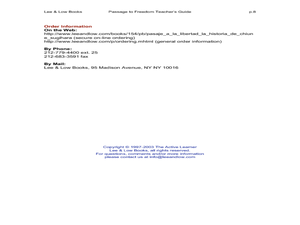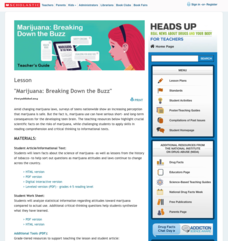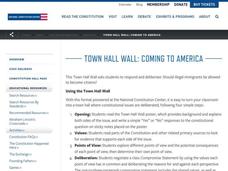Fluence Learning
Writing Informational Text: Lemonade Stand
Use a performance task to assess third graders' ability to read informational text. After they plan a lemonade stand business, young entrepreneurs implement that plan through informational writing. The task assumes learners can...
Fluence Learning
Writing About Informational Text: Beyond the Beyond—Galaxies
Everyone has a different point of view, even when it comes to the enormity of the universe. Two separate text passages explain the scope of a galaxy, prompting young readers to write an essay about each author's argument and how the...
College Board
Reading—Synthesis and Paired Passages
Good readers make connections between texts. The SAT regularly assesses the ability to make those connections using paired reading passages, a topic discussed in an official SAT practice lesson plan on synthesis. During the lesson,...
Ontario
Reading Informational Text
Learning to recognize the importance of the features of information text (i.e., titles, subtitles, endnotes, sidebars, etc.) is the focus of a reading activity designed for middle schoolers. Learners examine how these text features help...
EngageNY
Synthesizing from Informational Texts: Main Idea and Key Details from Promises to Keep (Pages 8– 10)
Learners determine the main idea of a timeline on pages eight and nine of the text Promises to Keep. They use the timeline to complete a Main Idea and Details note catcher and then share their thoughts with the class. To finish,...
EngageNY
Building Background Knowledge, Predicting, and Focusing on Key Vocabulary: “Refugees: Who, Where, Why”
Using the fourth of 20 lessons from the Grade 8 ELA Module 1, Unit 2 series, scholars discuss refugees' challenges when finding a place to call home. They also read and answer text-based questions about the informational passage...
Curated OER
Passage to Freedom Teacher's Guide
Students explore the main elements of the book Passage to Freedom. In this reading response lesson, students participate in pre-reading activities that focus on the idea of courage. Students conduct a book walk-through and are introduced...
Odell Education
Making Evidence-Based Claims: Grade 8
American women have been working toward equal rights since the ink dried on the Declaration of Independence. Focused on the words and actions of Sojourner Truth, Shirley Chisholm, and Venus Williams, a language arts lesson takes eighth...
Core Knowledge Foundation
Unit 2: Early American Civilizations
Fifth graders explore early American civilizations in a four-week ELA unit. Every lesson offers an opportunity to read and discuss a selected passage followed by word work that covers vocabulary, grammar, and morphology. Learners write...
US Department of Agriculture
Agriculture Counts
Agricultural survey and the documentation of livestock or goods was the basis for the first written language. Youngsters discuss sorting and counting, and how these skills have been used for thousands of years. They accent their class...
ReadWriteThink
"Three Stones Back": Using Informational Text to Enhance Understanding of Ball Don't Lie
"Three Stones Back," a passage from Matt de la Pena's best-seller, Ball Don't Lie, allows readers to practice their close reading skills as they compare the passage to an information text about wealth inequality.
Scholastic
Marijuana: Breaking Down the Buzz
Teenagers get the real information about marijuana use based on the history of tobacco legislation and research. As they read an educational passage about marijuana laws, science, and changing attitudes, they address their preconceptions...
Carolina K-12
Comparing Slave Trades: A Study of the Transatlantic and Trans-Saharan Slave Trades
While most people are familiar with the transatlantic slave trade, there is less knowledge of another major external African slave trade in world history: the trans-Saharan slave trade. Pupils work in groups to read informational texts...
Great Books Foundation
On the Origin of Species
How did Charles Darwin support his controversial theory of evolution with evidence? Use an excerpt from his 1859 work On the Origin of Species to reinforce the importance of making inferences within an informational text, and to discuss...
ProCon
Obamacare
Former President Barack Obama reformed the United States' health care system with Obamacare, but is the new legislation good for America? Scholars read a historical timeline about the passage of health care reform laws and compare United...
Annenberg Foundation
Exploring Borderlands
What motivated Europeans to explore the New World, and what effects did their exploration have on Native American populations? The second installment of a 16-part American Passages series prompts pupils to watch a video and read several...
Constitutional Rights Foundation
Refugees: International Law and U.S. Policy
Discover the ways America has opened its borders to international refugees, and the ways other countries have been more or less welcoming, with an informational passage about United States and international policies on refugees. After...
Curated OER
Reading Comprehension: Guinness Book of World Records
If your learners are curious about human achievement, superlatives, or esoteric trivia, the Guinness Book of Records is a way to tap into instrinsic motivation and relevance. Here's an informational reading that will grab their attention...
National Constitution Center
Town Hall Wall: Coming to America
Everyone seems to have an opinion on the status and rights of illegal immigrants. Help secondary learners research each perspective and arrive at their own conclusions with a collaborative exercise. As they read an informative passage...
Fluence Learning
Writing an Argument: Is Electronic Communication Helpful or Harmful?
Technology has undoubtedly improved the lives of people around the world—but has it improved communication? Seventh graders read two informative passages about the rise of texting and emailing versus in-person conversations before...
National Geographic
Rivers and the Gabcikovo-Nagymaros Project
Damming rivers has been a case of necessity versus negative environmental impact since the process began. Kids take on the role of a stakeholder in the proposed damming of the Danube River. They begin by reading arguments for and against...
Deliberating in a Democracy
Cyberbullying—Alternate Lesson Plan
Should schools be permitted to punish young scholars for off-campus cyberbullying? After reading a passage that details statistics about cyberbullying and Supreme Court rulings about schools' ability to limit student speech, class...
American Chemical Society
The Periodic Table and Energy-Level Models
Teach your class to think of electrons as tiny packets of energy that travel in waves. Through a short video and diagram, participants see how electrons are located around the nucleus of an atom. They then get into groups and try to...
Teach Engineering
See the Genes
"If you can't explain it simply, you don't understand it well enough" - Albert Einstein. The sixth installment of a seven-part series teaches young scientists about the importance of being able to communicate scientific research and...

























